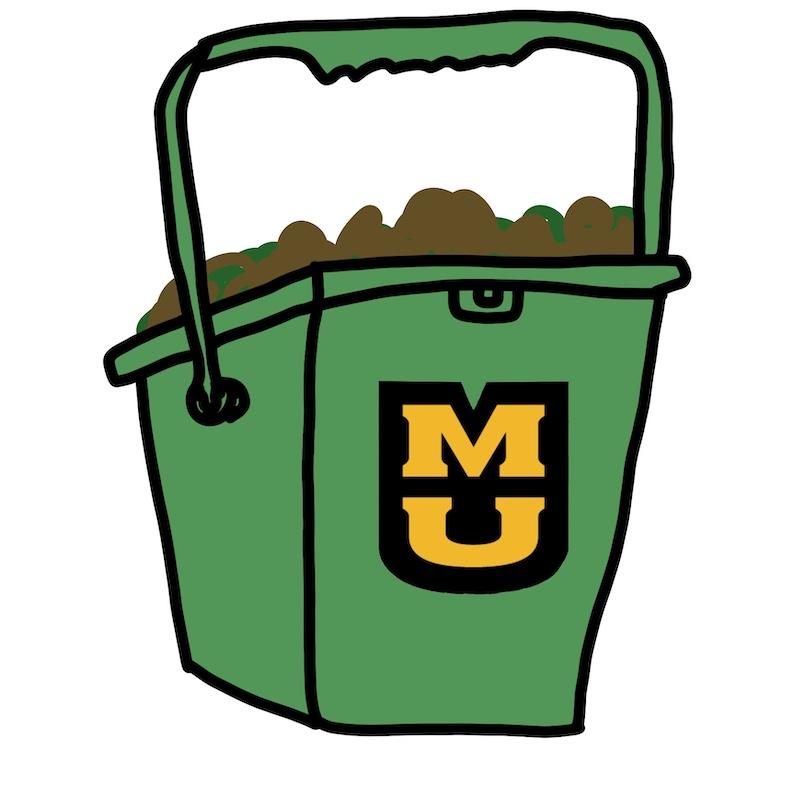Every coffee I get from Starbucks, every plastic water bottle I use and every bit of food I waste reminds me of the impact I have on our earth. I’ve spent a lot of time in my life thinking about this.
During a time when environmental issues place stress on younger generations, accessibility to sustainable choices is important to our futures as well as our mental health. Back home, it’s easier to practice my sustainability efforts in a controlled state. However, dorm life produces a lot of waste and fewer resources to carry out eco-friendly choices.
I’ve never composted before, but it has always been something I’ve wanted to try. A few weeks after arriving on campus, I looked into compost availability. Obviously, a single-serving compost wouldn’t work in a dorm, so I looked toward MU for sustainable options.
Currently, almost all of MU’s waste is sent directly to landfills. This includes food waste, plastics and all other non-recyclable waste. MU’s landscaping services compost leaves and other plant waste.
As of 2018, food waste takes up 21.59% of municipal solid waste, better known as garbage in the United States. The overflowing landfills create pollution in surrounding water and land, causing toxins and greenhouse gas emissions.
Because of the lack of composting, materials such as fruit, vegetables and dairy release methane, harming our ecosystem. This causes heat to be trapped in our atmosphere, thus contributing largely to climate change and pollution.
MU has tried multiple times in the past years to create a composting system, but with the Sustainability Office closure, efforts will now fall upon the students.
Since 2010, the amount of compostable materials in landfills has risen by at least 1.5 million tons each year. Composting at MU should start as soon as possible if there is any hope of creating a successful and lasting program.
Rollins dining halls and restaurants at Southwest have food grinders to help aid composting efforts, but there are no staff or resources to sort food scraps or bring them to a compost center. Currently, these machines are not being used for any type of composting efforts according to Stephanie Flemming, assistant director of MU News Bureau .
Composting on a scale as large as MU’s campus would take numerous employees, bins to load, trucks that can hold a large amount of materials — and the hardest part would probably be finding a place to dispose of the compost. In the past, MU worked with Bradford Research Center to compost some materials. Currently, all of Bradford’s composting availability is full according to Jody Cook, a volunteer compost program specialist.
Before 2012, schools such as Loyola University Chicago, Washington College and Kansas State University created successful composting systems available in dining halls and for students around campus. Despite the lack of food waste composting at MU in recent years, the campus has been rated highly in sustainability efforts by STARS.
With a lack of employees and vehicles to take away compost, the materials needed to properly compost green and brown materials and the sustainability office closed, MU is unequipped to begin the process to create a lasting composting plan on campus. If students were to create a system, planning would need to begin as soon as possible.
For now, students can take extra steps in their daily routines, such as using reusable water bottles, decreasing food waste, taking shorter showers, reducing waste, buying sustainable clothing and unplugging electronics when not in use. But to help MU become a more sustainable and environmentally friendly campus, these steps are not enough to stop the rapid warming of the planet.
The Maneater encourages all readers to commit to defending Missouri’s lands. Donations can be made at the Great Rivers Environmental Law Center. “Great Rivers receives no government funding and provides our services free of charge to defend the people and places that need us most.” https://greatriverslaw.org/donate/
Edited by Cayli Yanagida | [email protected]












